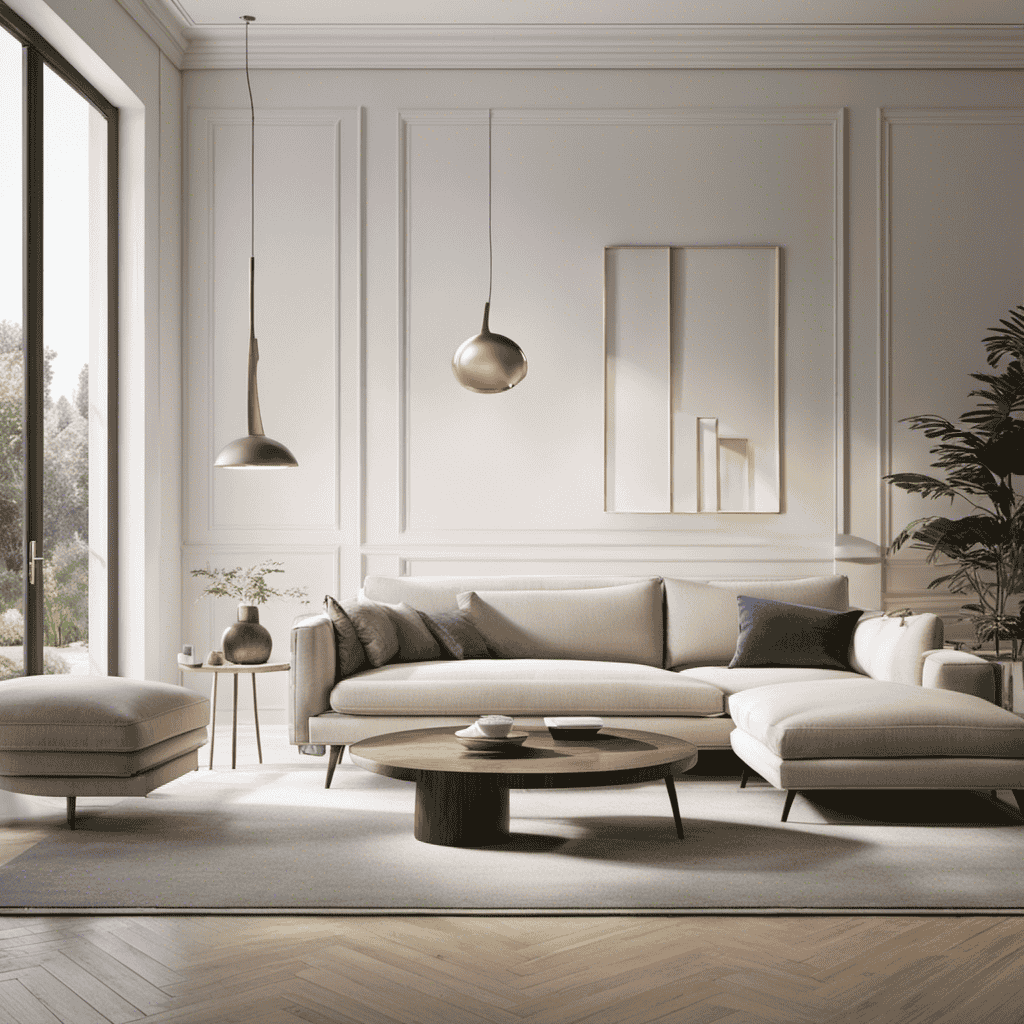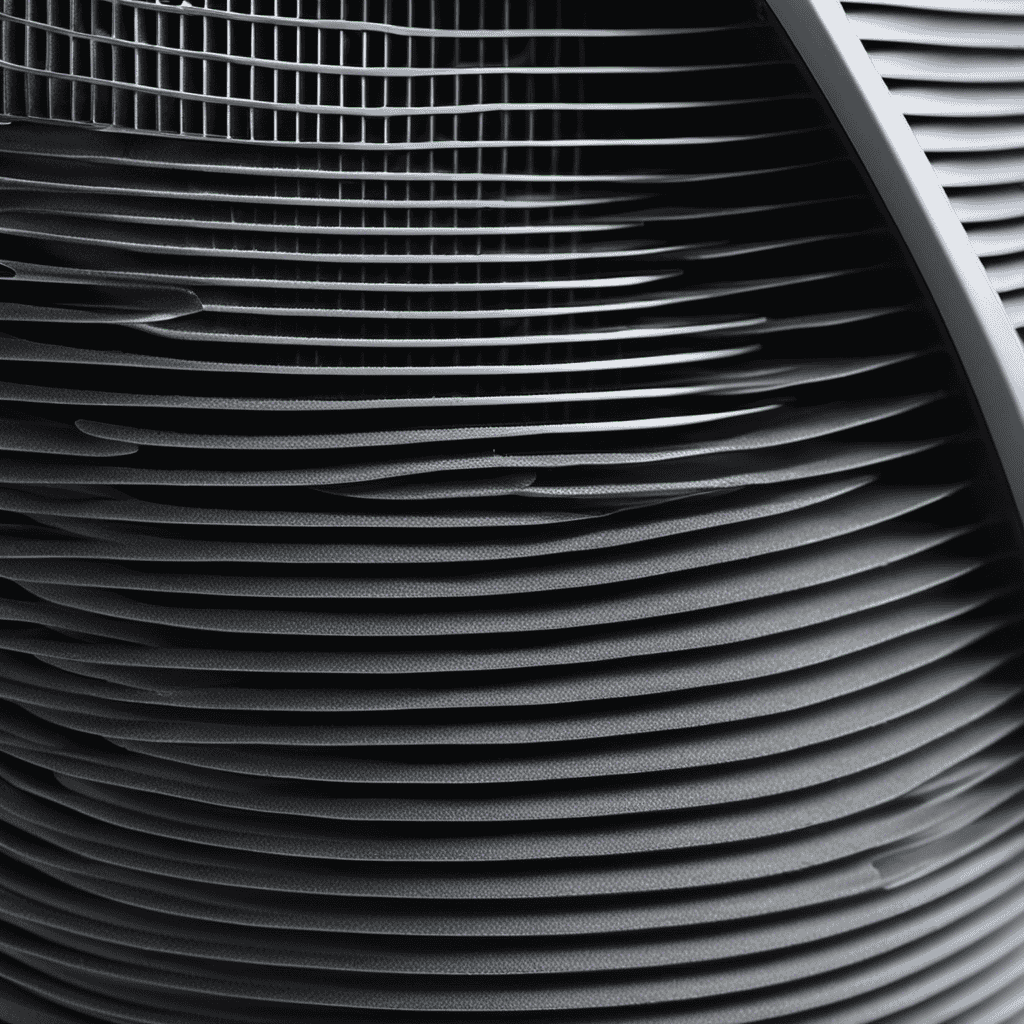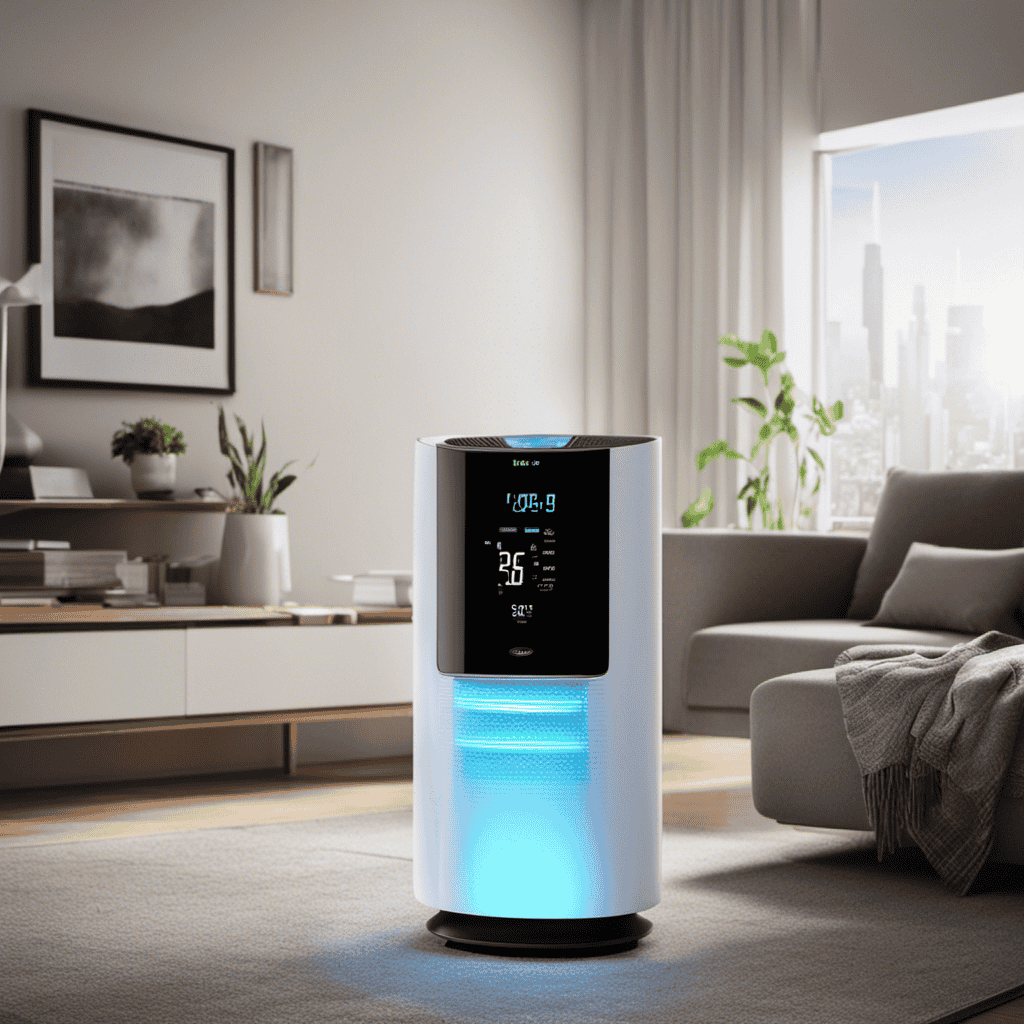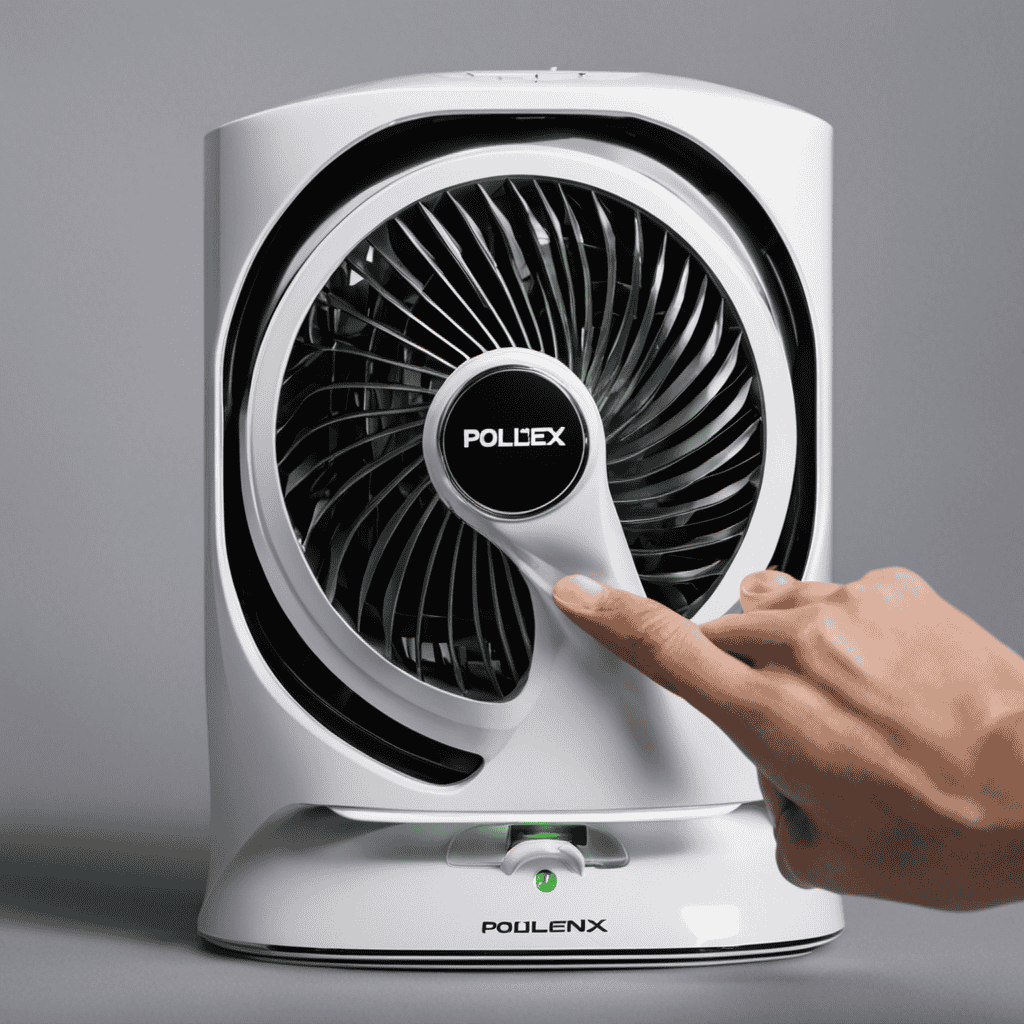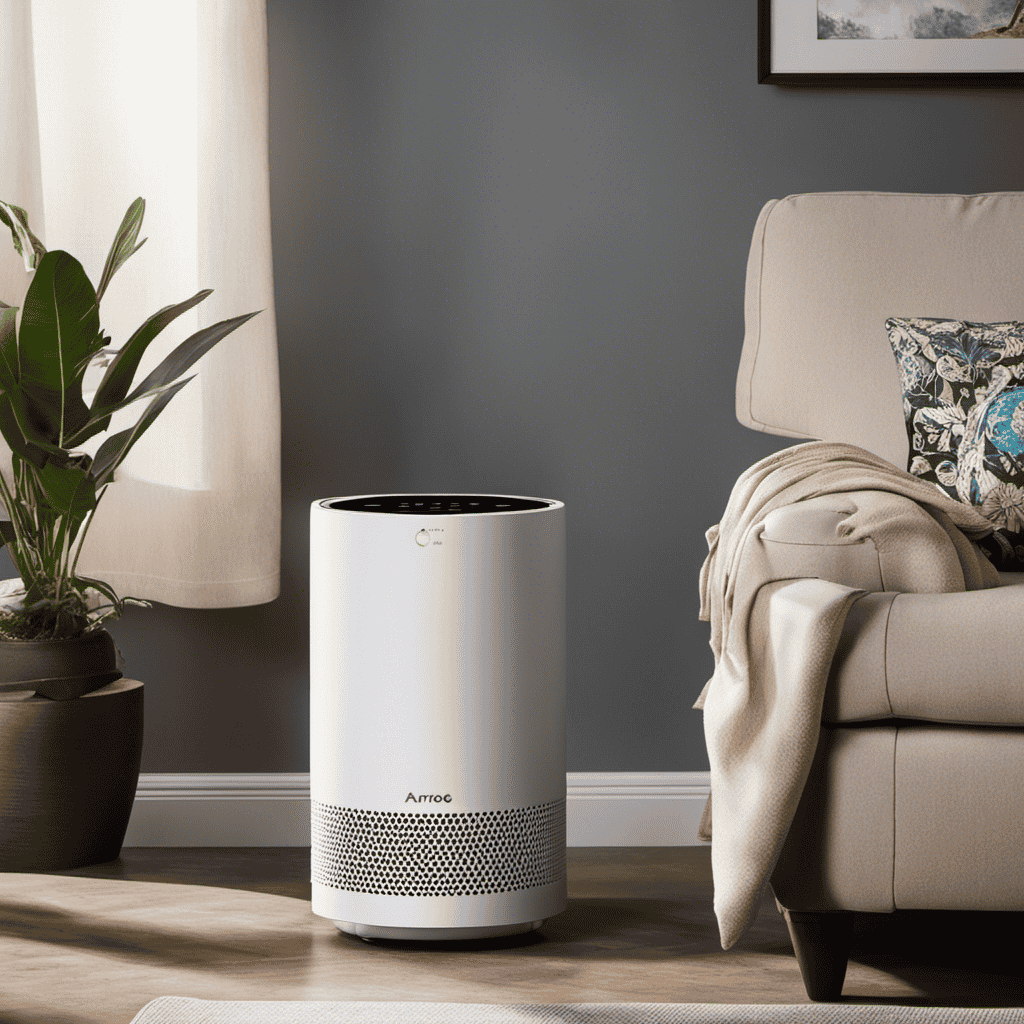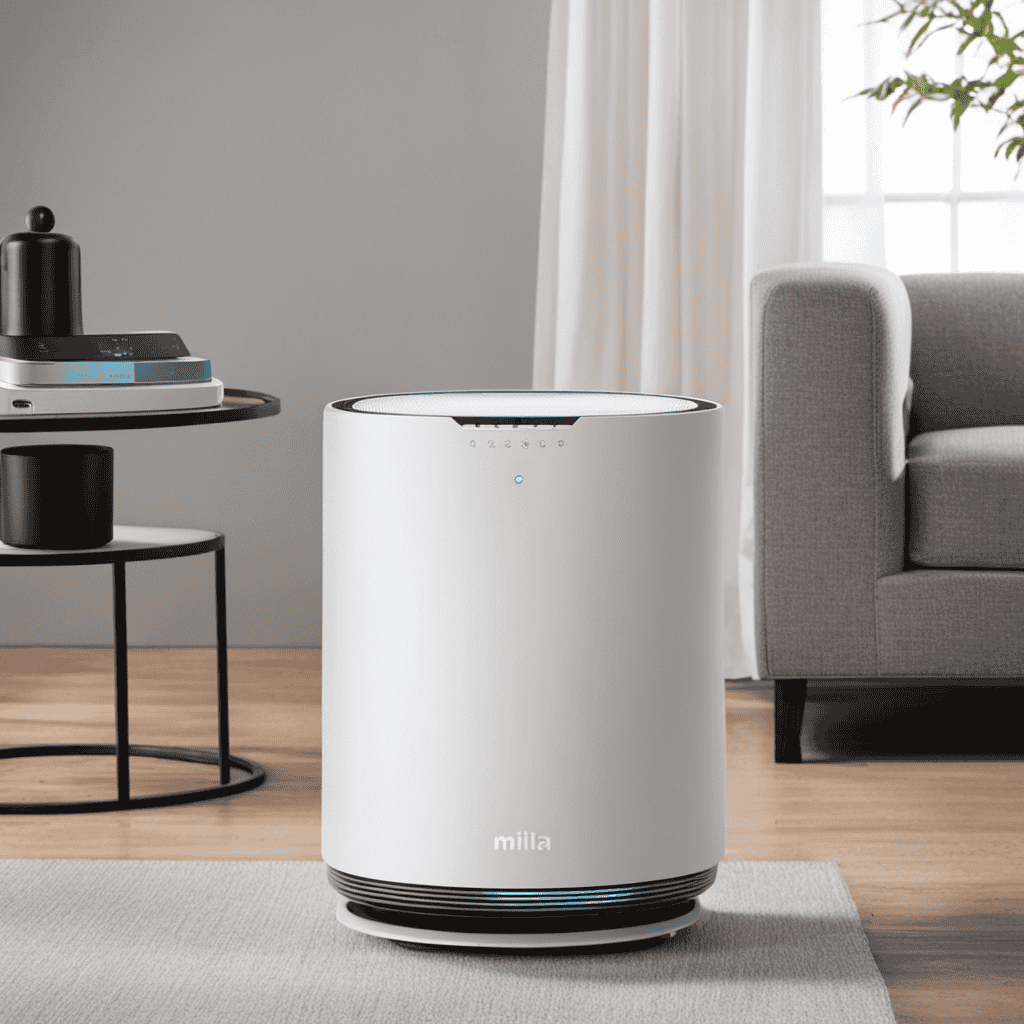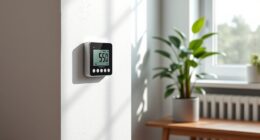As someone who prioritizes clean and healthy indoor air, I have frequently pondered how an air purifier can genuinely enhance the quality of the air we breathe.
Well, the answer lies in the science behind these devices. Air purifiers work diligently to remove common pollutants, such as dust, pollen, and pet dander, from our living spaces.
In this article, we will explore the various health benefits of using an air purifier, the different types available, and how they can enhance our overall well-being.
So let’s dive in and uncover the secrets of these remarkable machines.
Key Takeaways
- Air purifiers remove harmful pollutants from the air.
- Air purifiers alleviate symptoms of allergies, asthma, and respiratory conditions.
- Air purifiers reduce the risk of respiratory infections.
- Air purifiers improve sleep quality and eliminate odors and tobacco smoke.
Health Benefits of Using an Air Purifier
Using an air purifier can significantly improve your health by removing harmful pollutants from the air you breathe. Air purifiers utilize advanced technology to effectively capture and eliminate various contaminants, such as dust, pollen, pet dander, mold spores, and volatile organic compounds (VOCs).
By reducing the concentration of these pollutants in the air, air purifiers can alleviate symptoms of allergies, asthma, and other respiratory conditions. Studies have shown that air purifiers can also help reduce the risk of respiratory infections and improve sleep quality.
Additionally, air purifiers can eliminate odors and tobacco smoke, creating a cleaner and fresher indoor environment. With their efficient filtration systems and cutting-edge technologies, air purifiers provide numerous health benefits, making them essential for maintaining a clean and pollutant-free living space.
Now, let’s explore the common air pollutants and how an air purifier can effectively remove them.
Common Air Pollutants and How an Air Purifier Can Remove Them
When it comes to air purifiers, it’s important to understand the types of pollutants they can effectively remove. By targeting common pollutants such as dust, pollen, pet dander, and mold spores, air purifiers can significantly improve indoor air quality.
The effectiveness of an air purifier in removing these pollutants is measured by its Clean Air Delivery Rate (CADR), which indicates the volume of clean air it can produce per minute.
Types of Pollutants Removed
Did you know that air purifiers can remove a wide range of pollutants from the air in your home? Understanding the types of pollutants that can be eliminated by an air purifier is crucial in maintaining a healthy indoor environment.
Pollutant sources can vary, including dust, pet dander, pollen, mold spores, and volatile organic compounds (VOCs) emitted from cleaning products and furniture. These pollutants can have detrimental effects on our health, causing respiratory issues and allergies.
However, by regularly maintaining your air purifier, you can ensure its optimal performance in removing these pollutants. This includes cleaning or replacing filters, checking fan motors, and keeping the unit free from dust and debris.
Air Purifier Effectiveness
Regular maintenance of an air purifier, such as cleaning or replacing filters, can ensure its optimal performance in removing pollutants and improving indoor air quality. The effectiveness of an air purifier in removing pollutants is directly related to the level of maintenance it receives.
A well-maintained air purifier can effectively capture and remove a wide range of indoor pollutants, including dust, pollen, pet dander, and even smoke particles. However, if the filters are not regularly cleaned or replaced, the purifier’s efficiency can decline, leading to reduced pollutant removal.
Additionally, regular maintenance can also help in reducing noise levels produced by the air purifier. Dust accumulation on the fan or motor can cause increased noise levels, which can be prevented by proper cleaning and maintenance.
Overall, regular maintenance is crucial for maximizing the effectiveness and minimizing noise levels of an air purifier.
Health Benefits Explained
Proper maintenance ensures an air purifier operates at its best, maximizing its ability to remove pollutants and improve indoor air quality. Regularly cleaning or replacing filters is essential for optimal performance.
Here are some key benefits of using an air purifier:
-
Reduction of allergens: Air purifiers effectively capture and eliminate common allergens like pollen, dust mites, and pet dander, providing relief for allergy sufferers.
-
Removal of airborne bacteria and viruses: Advanced air purifier technology can capture and destroy harmful airborne pathogens, reducing the risk of respiratory infections.
-
Odor elimination: Air purifiers equipped with activated carbon filters can effectively remove unpleasant odors caused by cooking, pets, or smoke.
-
Improved overall health: By removing pollutants and improving indoor air quality, air purifiers can help reduce respiratory symptoms, enhance sleep quality, and promote overall well-being.
Understanding the different types of air purifiers will further help in selecting the right one for your specific needs.
Understanding the Different Types of Air Purifiers
There’s a wide variety of air purifiers available, each with its own unique features and benefits.
When it comes to air purifier maintenance, it is essential to understand the different types of air purifiers and how they can benefit people with respiratory conditions.
HEPA filters, for instance, are highly effective in removing particles as small as 0.3 microns from the air, making them ideal for individuals suffering from allergies or asthma.
Activated carbon filters, on the other hand, are excellent at removing odors and chemicals from the air, providing relief for those with sensitivities.
Additionally, some air purifiers use UV-C light technology to kill airborne germs and bacteria, further improving indoor air quality.
Regular cleaning and filter replacement are crucial to ensure optimal performance and prolong the lifespan of the air purifier, making it an effective tool for maintaining clean and healthy indoor air.
How Air Purifiers Improve Indoor Air Quality
If you want to improve indoor air quality, consider using an air purifier with HEPA filters or activated carbon filters. Air purifiers are effective in removing pollutants from the air, making it cleaner and healthier to breathe.
Here are some ways air purifiers help improve indoor air quality:
-
Removal of airborne particles: HEPA filters can capture particles as small as 0.3 microns, including dust, pollen, pet dander, and mold spores.
-
Odor elimination: Activated carbon filters can absorb and neutralize unpleasant odors, such as smoke, cooking smells, and pet odors.
-
Reduction of allergens: Air purifiers help reduce allergens in the air, providing relief to those with allergies or asthma.
-
Removal of volatile organic compounds (VOCs): Activated carbon filters can also capture harmful chemicals and VOCs, improving overall air quality.
When considering air purifiers, it’s important to factor in maintenance costs, such as filter replacements, and the initial cost of the unit itself. Regular maintenance ensures optimal performance and longevity of the air purifier.
The Role of Air Purifiers in Allergy Relief
Air purifiers play a crucial role in allergy relief by effectively removing airborne allergens from indoor spaces. These devices are designed to improve indoor air quality by capturing and trapping allergens such as pollen, dust mites, pet dander, and mold spores.
Airborne Allergen Removal
An air purifier can help reduce the presence of airborne allergens in your home. This is achieved through the filtration system that captures and removes particles from the air. These appliances have several benefits, including improving indoor air quality and reducing the risk of allergies and respiratory issues.
Here are some key ways in which air purifiers contribute to a healthier living environment:
-
Removal of allergens: Air purifiers effectively trap and remove common allergens such as pollen, pet dander, and dust mites, reducing their concentration in the air.
-
Elimination of odors: By capturing and neutralizing odorous particles, air purifiers help to eliminate unpleasant smells, creating a fresher and more pleasant indoor environment.
-
Reduction of airborne pollutants: Air purifiers are capable of removing harmful pollutants like smoke, mold spores, and volatile organic compounds (VOCs), contributing to a cleaner and safer living space.
-
Enhancement of respiratory health: By reducing the presence of airborne allergens and pollutants, air purifiers can help alleviate allergy symptoms, asthma attacks, and respiratory issues, promoting better respiratory health overall.
Improved Indoor Air Quality
One way to achieve improved indoor air quality is by using an air purifier that effectively removes airborne allergens and pollutants.
Air purifiers play a crucial role in reducing allergies and improving respiratory health. Studies have shown that air purifiers can significantly reduce the levels of allergens, such as dust mites, pollen, and pet dander, in indoor spaces.
By removing these allergens from the air, air purifiers help to alleviate allergy symptoms and prevent respiratory issues. Furthermore, air purifiers are effective in removing other pollutants like smoke, mold spores, and volatile organic compounds (VOCs), which can have detrimental effects on respiratory health.
The benefits of air purifiers in reducing allergies and improving respiratory health are backed by scientific evidence and make them an essential addition to any indoor environment.
Reducing Allergy Symptoms
In the previous section, we discussed how air purifiers can improve indoor air quality by removing pollutants and allergens. Now, let’s delve into how air purifiers can specifically help in reducing allergy symptoms.
Allergies often result from the body’s immune system overreacting to certain substances, leading to symptoms such as sneezing, itching, and congestion. When allergens are present in the air, they can trigger an inflammatory response in the respiratory system, exacerbating these symptoms.
Air purifiers can aid in reducing inflammation and improving respiratory health by:
- Filtering out allergens such as pollen, dust mites, and pet dander.
- Capturing and neutralizing airborne irritants that can trigger allergies.
- Removing mold spores, which can cause respiratory issues.
- Creating a cleaner and healthier environment, reducing the overall allergen load.
By addressing these factors, air purifiers can provide relief from allergy symptoms and improve overall respiratory well-being. This makes them a valuable tool in managing allergies and maintaining a healthy indoor environment.
In the next section, we will discuss the specific benefits of air purifiers in managing asthma.
Air Purifiers and Asthma Management
Using an air purifier can greatly help manage my asthma symptoms. Air purifiers are highly effective in removing airborne pollutants and allergens that can trigger respiratory conditions like asthma. These devices work by filtering out particles such as dust, pet dander, pollen, and mold spores from the air, improving indoor air quality.
For children with asthma, air purifiers can provide significant benefits. Studies have shown that using air purifiers in homes with asthmatic children can reduce asthma symptoms, decrease the need for medication, and improve lung function.
Additionally, air purifiers can help create a cleaner and healthier environment, reducing the risk of respiratory infections and asthma exacerbations. Therefore, incorporating an air purifier into my daily routine can be an essential tool in managing my asthma and improving my overall respiratory health.
Air Purifiers Vs. Humidifiers: Which Is Better for Air Quality
When choosing between an air purifier and a humidifier, you’ll want to consider the specific needs of your indoor air quality. To help you make an informed decision, here are some key points to consider:
- Air purifiers are designed to remove airborne pollutants such as dust, pollen, and pet dander, improving overall air quality.
- Dehumidifiers, on the other hand, are used to reduce excess moisture in the air, which can help prevent mold growth and alleviate respiratory issues caused by high humidity.
Benefits of Using a Humidifier in Winter:
- Adds moisture to dry indoor air, preventing dry skin, irritated sinuses, and dry eyes.
- Relieves respiratory symptoms like congestion, coughing, and sore throat.
- Helps to maintain optimal humidity levels, which can reduce the transmission of airborne viruses.
- Provides a more comfortable indoor environment, especially during the winter months when heating systems can dry out the air.
The Science Behind Air Purifiers: How Do They Work
Air purifiers employ various air filtration mechanisms to remove pollutants from the air. These mechanisms typically include a combination of filters, such as high-efficiency particulate air (HEPA) filters, activated carbon filters, and electrostatic precipitators.
The pollutant removal process involves the air being drawn into the purifier, where it passes through the filters and is effectively cleaned. This results in improved indoor air quality and provides a range of health benefits, including reducing allergies, asthma symptoms, and respiratory issues.
Air Filtration Mechanisms
To effectively purify the air, you need to understand how the filtration mechanisms work in an air purifier. Air filtration technology plays a crucial role in removing harmful pollutants and allergens from the air. Here are the key mechanisms involved:
- Pre-filter: Traps larger particles like dust and pet dander.
- Activated carbon filter: Absorbs odors, chemicals, and volatile organic compounds (VOCs).
- HEPA filter: Captures 99.97% of particles as small as 0.3 microns, including pollen, mold spores, and bacteria.
- UV-C light: Destroys germs, viruses, and bacteria by altering their DNA structure.
These mechanisms work together to provide numerous benefits. Air purifiers improve indoor air quality, reducing the risk of respiratory diseases. They also alleviate allergy symptoms and create a cleaner, healthier environment.
With the advancement of technology, air purifiers continue to evolve, offering more efficient and effective filtration solutions.
Pollutant Removal Process
The pollutant removal process in an air purifier involves various mechanisms working together to eliminate harmful particles from the air. One of the key aspects of this process is pollutant detection, where sensors detect the presence of pollutants in the air. Once detected, the air purifier activates its filtration system to remove these particles.
The filtration system typically consists of a pre-filter that captures larger particles, such as dust and pet dander, and a HEPA filter that captures smaller particles like pollen, smoke, and bacteria. Regular air purifier maintenance is crucial to ensure optimal performance. This includes cleaning or replacing filters as recommended by the manufacturer.
By effectively removing pollutants from the air, air purifiers can contribute to improving indoor air quality and potentially provide health benefits.
Now, let’s delve into the health benefits explained.
Health Benefits Explained
Regular use of an air purifier can significantly improve indoor air quality, leading to potential health benefits for individuals. Air purifiers, equipped with advanced air purification technology, work diligently to remove airborne contaminants and pollutants from the surrounding environment.
Here are some key benefits of using air purifiers:
-
Reduction of allergens: Air purifiers effectively capture and eliminate allergens such as pollen, dust mites, and pet dander, providing relief for individuals suffering from allergies.
-
Removal of harmful particles: These devices eliminate harmful particles like bacteria, viruses, and mold spores, reducing the risk of respiratory infections and other related illnesses.
-
Odor elimination: Air purifiers help to eliminate unpleasant odors caused by cooking, pets, and cigarette smoke, creating a fresher and more pleasant indoor environment.
-
Improved sleep quality: By removing airborne irritants and allergens, air purifiers can potentially improve sleep quality, allowing individuals to wake up refreshed and rejuvenated.
With these significant health benefits, it is evident that air purifiers play a vital role in creating a healthier living space.
Now, let’s explore the specific benefits of using air purifiers for pet owners.
Benefits of Using Air Purifiers for Pet Owners
You’ll love how air purifiers can reduce pet dander and allergens in your home. As a pet owner, controlling pet dander is essential for maintaining a clean and healthy indoor environment. Air purifiers equipped with HEPA filters effectively trap and remove pet dander particles as small as 0.3 microns, ensuring cleaner air for you and your furry friend.
Additionally, these purifiers are designed to eliminate pet odors, making your home more pleasant and inviting. With advanced filtration technology, air purifiers can capture and neutralize odor-causing molecules, leaving your space smelling fresh.
How Air Purifiers Can Help Reduce the Spread of Airborne Viruses
Air purifiers play a crucial role in protecting us from airborne viruses. They effectively filter and purify the air we breathe. The filtration systems of these devices are designed to capture and remove tiny particles, including viruses, from the air. This reduces the risk of transmission.
Airborne Virus Protection
Using an air purifier can help protect against airborne viruses. Air purifiers are highly effective in removing harmful particles from the air, including viruses.
Here are some key points to consider when comparing air purifiers to humidifiers:
- Air purifiers are specifically designed to remove airborne contaminants, while humidifiers primarily increase the moisture levels in the air.
- Air purifiers utilize advanced filtration systems that can capture and eliminate viruses, bacteria, and other pollutants.
- Air purifiers can help reduce the risk of infection by continuously circulating and purifying the air in a room.
- Air purifiers are especially beneficial in spaces where people gather, such as offices, schools, and healthcare facilities.
With their ability to effectively remove airborne viruses, air purifiers are an essential tool for maintaining a healthy indoor environment.
Now, let’s delve into the specific filtration and purification technologies that make air purifiers so effective.
Filtration and Purification
When comparing air purifiers to humidifiers, it’s important to understand the different filtration and purification technologies they utilize. Air purifiers are designed to remove contaminants from the air, while humidifiers add moisture to the air. Both have their own benefits, but for the purpose of this discussion, let’s focus on air purifiers.
Air purifiers use various technologies to filter and purify the air, such as HEPA filters, activated carbon filters, and UV-C light. These technologies work together to effectively remove pollutants, allergens, and odors from the air. Regular maintenance is crucial to ensure optimal performance of air purifiers. This includes cleaning or replacing filters, regularly cleaning the unit, and checking for any malfunctions.
In offices, air purifiers provide several benefits. They improve indoor air quality, reducing the risk of respiratory illnesses and allergies. They also help eliminate unpleasant odors, creating a more pleasant and productive work environment. Furthermore, air purifiers can help reduce the spread of airborne viruses, contributing to a healthier and safer workplace.
| Technology | Description | Benefits |
|---|---|---|
| HEPA Filters | High-efficiency particulate air filters that trap small particles | Removes allergens, dust, and other airborne particles |
| Activated Carbon | Absorbs and neutralizes odors and chemicals | Eliminates unpleasant smells and harmful substances |
| UV-C Light | Uses ultraviolet light to kill bacteria, viruses, and mold spores | Reduces the spread of airborne pathogens |
Improved Indoor Air Quality
After discussing the importance of filtration and purification in the previous subtopic, it is now time to explore the benefits of air purifiers in improving indoor air quality.
Indoor air quality is crucial for our overall well-being, as we spend a significant amount of time indoors. Here are some key benefits of using air purifiers:
-
Removal of airborne pollutants: Air purifiers effectively remove pollutants such as dust, pollen, pet dander, and smoke particles from the air we breathe.
-
Reduced allergens: By eliminating allergens, air purifiers can help alleviate symptoms for individuals suffering from allergies or asthma.
-
Elimination of odors: Air purifiers can remove unpleasant odors caused by cooking, pets, or chemicals, resulting in fresher and cleaner indoor air.
-
Improved respiratory health: Cleaner air can lead to better respiratory health, reducing the risk of respiratory diseases and improving overall lung function.
Investing in an air purifier can greatly contribute to maintaining a healthier indoor environment by effectively removing airborne contaminants and improving the quality of the air we breathe.
Air Purifiers and Odor Elimination: How They Work Together
To effectively eliminate odors in your home, an air purifier works by filtering out particles that cause unpleasant smells.
Air purifiers are designed to capture and remove airborne contaminants, including odorous particles, through a combination of filtration technologies. These technologies typically include a pre-filter, a HEPA filter, and an activated carbon filter.
The pre-filter captures larger particles like dust, pet dander, and pollen. The HEPA filter then removes smaller particles, such as mold spores and bacteria, which can also contribute to unpleasant odors.
Finally, the activated carbon filter adsorbs and neutralizes odor molecules, effectively eliminating any lingering smells.
The Impact of Air Pollution on Children’s Health and How Air Purifiers Can Help
Air pollution can have a significant impact on children’s health, and air purifiers can be beneficial in mitigating the negative effects. Studies have shown that exposure to air pollution can have detrimental effects on children’s cognitive development. It can impair their attention span, memory, and overall brain function.
Thankfully, air purifiers have proven to be effective in reducing respiratory symptoms caused by air pollution. Here are some key benefits of air purifiers for children:
-
Improved respiratory health: Air purifiers can remove harmful pollutants, such as fine particles and allergens, from the air, reducing the risk of respiratory issues like asthma and allergies.
-
Enhanced cognitive development: By reducing exposure to air pollution, air purifiers can help protect children’s brain function and promote healthy cognitive development.
-
Better sleep quality: Cleaner air means better sleep, which is crucial for children’s growth and development.
-
Reduced risk of chronic diseases: Air purifiers can help minimize the risk of long-term health conditions associated with air pollution, such as respiratory diseases and cardiovascular problems.
Air Purifiers for Smokers: Can They Really Remove Smoke and Odor
Using an air purifier can effectively eliminate smoke and odor caused by smoking. When it comes to air purifiers for cars, their effectiveness in removing smoke has been widely studied.
Research has shown that air purifiers equipped with high-efficiency particulate air (HEPA) filters can effectively capture and remove smoke particles from the air. These filters are designed to trap tiny particles as small as 0.3 microns, which includes smoke particles.
In addition to HEPA filters, some air purifiers also utilize activated carbon filters, which are highly effective in removing odors. These filters contain activated carbon that absorbs and neutralizes smoke odors, leaving the air fresh and clean.
Therefore, investing in an air purifier for your car can significantly improve the air quality and eliminate the smoke and odor caused by smoking.
Air Purifiers and Sleep: How Clean Air Can Improve Your Sleep Quality
Clean air can greatly enhance the quality of your sleep. Numerous studies have shown that improving air quality can lead to better sleep patterns and overall sleep satisfaction.
Here are some key ways in which clean air can positively impact your sleep:
-
Reduction in allergens: Clean air helps to minimize the presence of common allergens such as dust mites, pollen, and pet dander, which can disrupt sleep and cause allergic reactions.
-
Decreased exposure to pollutants: Indoor air can contain pollutants like volatile organic compounds (VOCs), which have been linked to sleep disturbances. Clean air reduces exposure to these harmful substances.
-
Improved respiratory function: Breathing clean air improves lung function and can help reduce snoring and sleep apnea, leading to a more restful sleep.
-
Enhanced relaxation: Clean air promotes a calm and soothing environment, which can aid in relaxation and promote a deeper, more rejuvenating sleep.
Investing in an air purifier or ensuring proper ventilation can significantly improve your sleep by enhancing the air quality in your bedroom.
Factors to Consider When Choosing an Air Purifier for Your Home
When choosing an air purifier for your home, it’s important to consider factors such as room size, noise level, and filter replacement frequency. These factors will help ensure that you choose the right air purifier that meets your specific needs.
When it comes to air purifier features, there are several options to consider. Some air purifiers come with multiple fan speeds, allowing you to adjust the airflow based on your preferences. Others offer different types of filters, such as HEPA filters for capturing small particles or activated carbon filters for removing odors.
Additionally, cost considerations are also important. While air purifiers can vary in price, it’s essential to balance the initial cost with the long-term maintenance expenses, such as filter replacements.
Frequently Asked Questions
Can Air Purifiers Completely Remove All Types of Air Pollutants?
Air purifiers can effectively reduce indoor air pollution, but cannot completely remove all types of air pollutants. They offer various health benefits by capturing and filtering harmful particles, improving overall air quality.
Are All Air Purifiers Equally Effective in Improving Indoor Air Quality?
When comparing the effectiveness of air purifiers in improving indoor air quality, cost effectiveness analysis is crucial. Not all air purifiers are equally effective, so it’s important to consider their performance and features before making a purchase.
Can Air Purifiers Eliminate Pet Dander and Allergens From the Air?
Yes, air purifiers can eliminate pet dander and allergens from the air. Their effectiveness in removing these particles depends on the specific model and its filtration system. Using an air purifier can greatly benefit those with allergies or asthma.
Do Air Purifiers Help in Reducing the Spread of Airborne Viruses Like Covid-19?
Air purifiers are a powerful weapon in the battle against airborne diseases like COVID-19. They effectively reduce the spread of viruses by filtering out harmful particles, providing a shield of protection for your health.
What Factors Should Be Considered When Choosing an Air Purifier for a Specific Room Size?
When choosing an air purifier for a specific room size, it’s important to consider the room dimensions, CADR ratings, and filtration technology. These factors will help ensure optimal performance and cleaner air.
What are the Benefits of Using an Air Purifier?
Using a blue air purifier functionality in your home or office can offer numerous benefits. It helps to clean the air by removing allergens, dust, and pollutants, leading to improved air quality. Additionally, air purifiers can help reduce odors and create a healthier environment for those with respiratory issues.
Conclusion
In conclusion, air purifiers are a valuable investment for improving indoor air quality and promoting better health.
By effectively removing common air pollutants such as dust, pollen, and pet dander, air purifiers create a cleaner and healthier environment.
They can also provide relief for allergies and respiratory conditions, especially in children.
Additionally, air purifiers can help eliminate smoke and odor, making them beneficial for smokers.
With cleaner air, you can enjoy a good night’s sleep and wake up feeling refreshed.
So, why wait? Take the plunge and breathe easier with an air purifier.
Remember, a breath of fresh air is worth its weight in gold.
